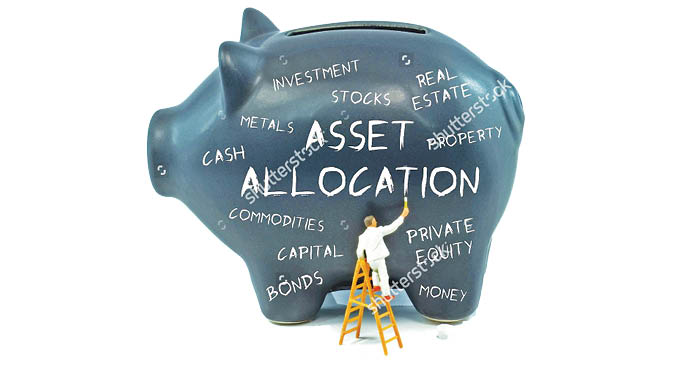Imagine if all your fingers were of the same length, it would be useless. Likewise, in every investment, the asset class needs to differ from each other to integrate diversity of risk and optimise returns. Asset Allocation to investments is what wheels are to a car, it is the backbone of any financial planning and unfortunately one of the most neglected subjects in the world of investments. Did you know that asset allocation determines over 90% of the portfolio returns and the rest is due to product selection and timing of investments? It supersedes product selection and market opportunities. Asset allocation is the diversification of funds across different asset classes based on the investor’s age, risk appetite and time horizon. Asset class signifies ‘low-risk, low-returns’ and ‘high-risk, high-returns’ products. E.g. Fixed Deposits, PPF, tax free bonds, stocks, mutual funds, Gold, Real Estate, etc.
 Unfortunately, investors seem more kicked about where to invest rather than how to invest. They are either coaxed by their friends/relatives about the next multi-bagger investment or follow their own instinct because a specific asset class is doing well. This practice not only sabotages the basic philosophy of diversification but also destroys one’s wealth. One person’s food may be another’s poison, what investment may suit someone may not be right for you because everyone’s risk appetite differs. Be it gold, real estate, stock market, bonds, fixed deposits, etc. none of them give constant returns and they all have their own headwinds and market cycles. Today, real estate is bleeding, deposits rates are abysmally low and gold is like a dead investment. Imagine a few years ago, the same asset classes were considered mouth-watering investments. The only thing constant in an economy is change. No asset class performs consistently forever.
Unfortunately, investors seem more kicked about where to invest rather than how to invest. They are either coaxed by their friends/relatives about the next multi-bagger investment or follow their own instinct because a specific asset class is doing well. This practice not only sabotages the basic philosophy of diversification but also destroys one’s wealth. One person’s food may be another’s poison, what investment may suit someone may not be right for you because everyone’s risk appetite differs. Be it gold, real estate, stock market, bonds, fixed deposits, etc. none of them give constant returns and they all have their own headwinds and market cycles. Today, real estate is bleeding, deposits rates are abysmally low and gold is like a dead investment. Imagine a few years ago, the same asset classes were considered mouth-watering investments. The only thing constant in an economy is change. No asset class performs consistently forever.
How To Decide Your Asset Allocation?
Age:
Age is instrumental in deciding your asset allocation. The rule of thumb is that the age of the investor determines the percentage exposure into low-risk, low-return assets (debt instruments like fixed deposits, PPF, post office, etc.) and high-risk, high-return assets (Equity stocks, Equity Mutual funds, etc.). E.g. At my age of 38 years, my exposure into safe avenues (debt) should be 38% and balance 62% can be deployed into high risk high return products (equity). In short, the older I get the higher will be my exposure into safe instruments, this is because my earning years will subsequently reduce as I age.
Risk Appetite:
 Risk appetite is unique in every individual’s case. That’s the primary reason investors should not copy others’ investment portfolios, because the risk appetite to bear volatility differs as per the individual. A person with high risk appetite is an aggressive investor and invests around 80% into equity related instruments and someone with low risk appetite is a conservative investor 80% into debt and balance into equity.
Risk appetite is unique in every individual’s case. That’s the primary reason investors should not copy others’ investment portfolios, because the risk appetite to bear volatility differs as per the individual. A person with high risk appetite is an aggressive investor and invests around 80% into equity related instruments and someone with low risk appetite is a conservative investor 80% into debt and balance into equity.
Time Horizon:
The longer the duration (5-10 years) the higher the exposure into equity related instruments (high-risk, high-return) because over a long span, risk is mitigated. Did you know that over the last 23 years, a mutual fund scheme by the name of Franklin India Blue Chip Fund has delivered an average return of 21.92% per annum – that’s even better than any real estate return! However, during their worst period in 2008, they delivered negative 50%! Therefore, if you’re a short-term investor (3-5 years) then your risk appetite should be conservative with an allocation of 80% debt and 20% equity.
I’ve written umpteen times on asset allocation and have every time stressed upon one point, investment without Asset Allocation is like a tree without roots, it’s just a piece of dead wood, it just won’t grow.
- We Can’t Predict. We Can Prepare! - 31 July2021
- Patience Is The Key - 7 September2019
- Market Crashed? Big Deal! - 27 October2018